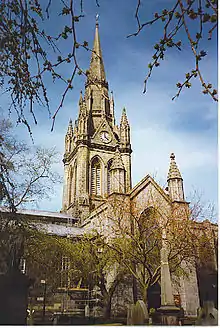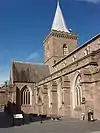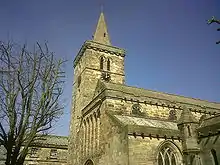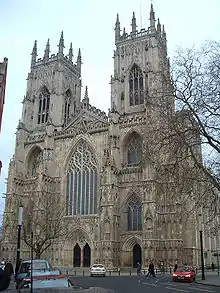List of carillons of the British Isles
Carillons, musical instruments in the percussion family with at least 23 cast bells and played with a keyboard, are found throughout the British Isles as a result of the First World War. During the German occupation of Belgium, many of the country's carillons were silenced or destroyed. This news circulated among the Allied Powers, who saw it as "the brutal annihilation of a unique democratic music instrument".[1][2] The destruction was romanticized in poetry and music, particularly in England. Poets – often exaggerating reality – wrote that the Belgian carillons were in mourning and awaited to ring out on the day of the country's liberation. Edward Elgar composed a work for orchestra which includes motifs of bells and a spoken text anticipating the victory of the Belgian people.[3] He later even composed a work specifically for the carillon.[4] Following the war, countries in the Anglosphere built their own carillons to memorialise the lives lost and to promote world peace,[2] including two in England.[5]

The Carillon Society of Britain and Ireland (CSBI) counts carillons throughout the British Isles.[6] Dove's Guide for Church Bell Ringers, a publication that historically concerns itself with bell sets outfitted for full circle ringing, also counts carillons in the region.[7] According to the two sources, there are fifteen carillons: eight in England, one in the Republic of Ireland, one in Northern Ireland, and five in Scotland. There are no carillons in Guernsey, the Isle of Man, Jersey or Wales.[6]
The heaviest carillon is at the Kirk of St Nicholas in Aberdeen, Scotland, weighing 25,846 kilograms (56,981 lb); the lightest is at the Atkinsons Building in London, weighing 3,194 kilograms (7,041 lb). The carillon of St Colman's Cathedral in Cobh has the most bells – 49. The region has several two- and three-octave carillons. The heaviest two-octave carillon in the world – weighing 22,669 kg (49,976 lb) – is located in Newcastle upon Tyne.[8] The carillons were primarily constructed in the interwar period by the English bellfounders Gillett & Johnston and John Taylor & Co.[6] Almost all of the carillons are transposing instruments, all of which transpose such that the lowest note on the keyboard is C.[6]
According to the World Carillon Federation, the carillons of the British Isles account for two percent of the world's total.[9]
Criteria for inclusion
The World Carillon Federation defines a carillon as an instrument of at least 23 cast bronze bells hung in fixed suspension, played with a traditional keyboard of batons, and tuned in chromatic order so that they can be sounded harmoniously together. It may designate instruments of 15 to 22 bells built before 1940 as "historical carillons".[10] Its member organizations – including for example the Carillon Society of Britain and Ireland – also define a carillon with those restrictions.[11] This list contains only those carillons that meet the definition outlined by these organizations.
England
Northern Ireland
| Location | City | Bells | Bourdon weight | Total weight | Range and transposition |
Bellfounder(s) | Ref. | |||
|---|---|---|---|---|---|---|---|---|---|---|
| kg | lb | kg | lb | |||||||
 |
St Patrick's Cathedral (Roman Catholic) | Armagh | 39 | 2,190 | 4,830 | 10,850 | 23,910 |  None (concert pitch) |
John Taylor & Co 1920 | [29][30] |
Republic of Ireland
According to the CSBI, there is one carillon in the Republic of Ireland, which is located at St Colman's Cathedral in Cobh.[6] In 2019, playing this cathedral's carillon was recognized by the Irish government as key element of the country's living cultural heritage.[31]
| Location | City | Bells | Bourdon weight | Total weight | Range and transposition |
Bellfounder(s) | Ref. | |||
|---|---|---|---|---|---|---|---|---|---|---|
| kg | lb | kg | lb | |||||||
 |
St Colman's Cathedral | Cobh | 49 | 3,439 | 7,582 | 22,327 | 49,223 |  Down 3 semitones |
|
[32][33] |
Scotland
| Location | City | Bells | Bourdon weight | Total weight | Range and transposition |
Bellfounder(s) | Ref. | |||
|---|---|---|---|---|---|---|---|---|---|---|
| kg | lb | kg | lb | |||||||
 |
Kirk of St Nicholas | Aberdeen | 48 | 4,571 | 10,078 | 25,846 | 56,981 |  Down 4 semitones |
Gillett & Johnston 1952–54 | [34][35] |
| — | St Patrick's Church | Dumbarton | 23 | 860 | 1,900 | 4,603 | 10,148 | Up 6 semitones |
Gillett & Johnston 1927–28 | [36][37] |
 |
St Marnock's Church | Kilmarnock | 30 | 635 | 1,401 | 4,272 | 9,418 | Up 7 semitones |
Mears & Stainbank (Whitechapel) 1954 | [38][39] |
 |
St John's Kirk | Perth | 35 | 1,430 | 3,150 | 7,883 | 17,379 | Up 1 semitone |
|
[40][41] |
 |
Holy Trinity Church | St Andrews | 27 | 1,593 | 3,512 | 7,587 | 16,726 | Up 1 semitone |
John Taylor & Co 1926–98 | [42][43] |
See also
Notes
- The carillon was moved from the Mostyn House School in 2010.
References
- Thorne, Stephen J. (21 November 2018). "The Seizing of Europe's Bells". Legion. OCLC 1120054332. Archived from the original on 26 January 2021. Retrieved 14 April 2021.
- "Carillons and Peace". War Memorial and Peace Carillons. Retrieved 1 August 2022.
- Rombouts, Luc (2014). "The Broken Bells of Flanders". Singing Bronze: A History of Carillon Music. Translated by Communicationwise. Leuven University Press. pp. 195–200. ISBN 978-90-5867-956-7.
- Orr, Scott Allan (2022). "The Origins, Development, and Legacy of Elgar's Memorial Chimes (1923)" (PDF). Beiaard- en klokkencultuur in de Lage Landen [Carillon and Bell Culture in the Low Countries] (1 ed.). Amsterdam University Press. 1: 81–101. doi:10.5117/BKL2022.1.004.ORR. S2CID 249082470.
- "World map of peace carillons". War Memorial and Peace Carillons. Archived from the original on 19 December 2020. Retrieved 4 February 2021.
- "Carillons in Britain and Ireland". Carillon Society of Britain and Ireland. Retrieved 19 July 2022.
- "About Dove's Guide". Dove's Guide for Church Bell Ringers. Retrieved 26 July 2022.
- "Edith Adamson Carillon, Newcastle Civic Centre". Carillon Society of Britain and Ireland. Retrieved 3 July 2022.
- "Carillons". World Carillon Federation. Archived from the original on 11 January 2021. Retrieved 30 January 2021.
- "Organization". World Carillon Federation. Archived from the original on 9 March 2021. Retrieved 14 June 2021.
The definition of a carillon is fixed as follows: 'A carillon is a musical instrument composed of tuned bronze bells which are played from a baton keyboard'. Only those carillons having at least 23 bells will be taken into consideration.
- "What Is a Carillon?". Carillon Society of Britain and Ireland. Retrieved 18 May 2023.
A Carillon is a musical instrument consisting of 23 or more cast bronze, traditionally shaped bells, which have been precisely tuned so that any bells can be sounded together to produce a harmonious effect.
- "George Cadbury Memorial Carillon, Bournville Village Primary School". Carillon Society of Britain and Ireland. Retrieved 3 July 2022.
- "Birmingham, West Midlands, Bournville Village Primary School, Bournville". Dove's Guide for Church Bell Ringers. Archived from the original on 5 April 2022. Retrieved 3 July 2022.
- "War Memorial Carillon, Charterhouse School". Carillon Society of Britain and Ireland. Retrieved 3 July 2022.
- "Godalming, Surrey, Charterhouse School". Dove's Guide for Church Bell Ringers. Archived from the original on 5 April 2022. Retrieved 3 July 2022.
- "Godalming, World War I Memorial Carillon (United Kingdom)". War Memorial and Peace Carillons. Archived from the original on 7 May 2021. Retrieved 4 July 2022.
- "Atkinson Carillon, Old Bond Street". Carillon Society of Britain and Ireland. Retrieved 3 July 2022.
- "Mayfair, Greater London, 24 Old Bond St". Dove's Guide for Church Bell Ringers. Archived from the original on 5 April 2022. Retrieved 3 July 2022.
- "Loughborough Carillon and War Memorial". Carillon Society of Britain and Ireland. Retrieved 3 July 2022.
- "Loughborough, Leicestershire, War Memorial, Queen's Park". Dove's Guide for Church Bell Ringers. Archived from the original on 5 April 2022. Retrieved 3 July 2022.
- "Loughborough, War Memorial Carillon (United Kingdom)". War Memorial and Peace Carillons. Archived from the original on 2 May 2019. Retrieved 4 July 2022.
- "Newcastle upon Tyne, Tyne and Wear, Civic Centre". Dove's Guide for Church Bell Ringers. Archived from the original on 5 April 2022. Retrieved 3 July 2022.
- "Church of St. Mary, Lowe House". Carillon Society of Britain and Ireland. Retrieved 3 July 2022.
- "St Helens, Merseyside, S Mary, Lowe House (RC)". Dove's Guide for Church Bell Ringers. Archived from the original on 31 May 2022. Retrieved 3 July 2022.
- "Our Lady's Carillon". Carillon Society of Britain and Ireland. Retrieved 3 July 2022.
- "Birmingham, West Midlands, Our Lady of the Rosary and S Therese of Lisieux, Saltley (RC)". Dove's Guide for Church Bell Ringers. Archived from the original on 5 April 2022. Retrieved 3 July 2022.
- "The Cathedral and Metropolitical Church of St Peter [York Minster]". Carillon Society of Britain and Ireland. Retrieved 3 July 2022.
- "York, North Yorkshire, Cath & Metropolitical Ch of S Peter". Dove's Guide for Church Bell Ringers. Archived from the original on 5 April 2022. Retrieved 3 July 2022.
- "St Patrick's Roman Catholic Cathedral". Carillon Society of Britain and Ireland. Retrieved 3 July 2022.
- "Armagh, Armagh, Northern Ireland, Cath Ch of S Patrick (RC)". Dove's Guide for Church Bell Ringers. Archived from the original on 5 April 2022. Retrieved 3 July 2022.
- "Minister Madigan Announces State Recognition of Key Elements of Ireland's Living Cultural Heritage" (Press release). Dublin: Minister for Culture, Heritage and the Gaeltacht. MerrionStreet.ie. 18 July 2019. Archived from the original on 27 February 2021. Retrieved 4 May 2022.
- "St Colman's Cathedral". Carillon Society of Britain and Ireland. Retrieved 3 July 2022.
- "Cobh, Cork, Republic of Ireland, Cath Ch of S Colman (RC)". Dove's Guide for Church Bell Ringers. Archived from the original on 5 April 2022. Retrieved 5 April 2022.
- "Municipal Carillon, The Kirk of St Nicholas". Carillon Society of Britain and Ireland. Retrieved 3 July 2022.
- "Aberdeen, City of Aberdeen, Scotland, S Nicholas Kirk". Dove's Guide for Church Bell Ringers. Archived from the original on 5 April 2022. Retrieved 3 July 2022.
- "St Patrick's Church". Carillon Society of Britain and Ireland. Retrieved 3 July 2022.
- "Dumbarton, West Dunbartonshire, Scotland, S Patrick (RC)". Dove's Guide for Church Bell Ringers. Archived from the original on 5 April 2022. Retrieved 3 July 2022.
- "St Andrew's & St Marnock's Parish Church". Carillon Society of Britain and Ireland. Retrieved 3 July 2022.
- "Kilmarnock, East Ayrshire, Scotland, S Marnock". Dove's Guide for Church Bell Ringers. Archived from the original on 5 April 2022. Retrieved 3 July 2022.
- "St John's Kirk". Carillon Society of Britain and Ireland. Retrieved 3 July 2022.
- "Perth, Perth and Kinross, Scotland, S John Kirk". Dove's Guide for Church Bell Ringers. Archived from the original on 5 April 2022. Retrieved 3 July 2022.
- "Holy Trinity Parish Church". Carillon Society of Britain and Ireland. Retrieved 3 July 2022.
- "St Andrews, Fife, Scotland, Holy Trinity". Dove's Guide for Church Bell Ringers. Archived from the original on 5 April 2022. Retrieved 3 July 2022.
Further reading
- Berry, Alan P. S. (1980). "Carillons of the British Isles" (PDF). The Bulletin. The Guild of Carillonneurs in North America. 29 (1): 23–32. OCLC 998832003. Archived from the original on 10 February 2021. Retrieved 9 August 2022.
External links
- World list of carillons as compiled by the World Carillon Federation
- List of all types of bells in the British Isles as compiled by Towerbells.org



.jpg.webp)
.svg.png.webp)




